Stay in the know on all smart updates of your favorite topics.
Moving from a linear to a circular economy means minimising the waste and pollution by reducing, recycling and reusing. The City of Amsterdam aims to redesign twenty product- or material chains. The implementation of material reuse strategies has the potential to create a value of €85 million per year within the construction sector and €150 million per year with more efficient organic residual streams. Amsterdam set up an innovation program on the circular economy; www.amsterdamsmartcity.com/circularamsterdam. By converting waste into electricity, urban heating and construction materials, the Amsterdam Electricity Company generates 900 kWh per 1000 kg of waste. 75% of the sewage system is separated for waste and rain water and the silt which remains after treating waste water is converted into natural gas. Share your innovative concepts and ideas on circular economy here.
Unmanned systems & sustainability @Formula 1

Unmanned systems; Developments & challenges
<strong>Pieter Elands,</strong> Program Manager Unmanned Systems at TNO, is an experienced manager of people and complex research programs. Pieter will share insights into the latest developments and key challenges in the field of unmanned systems. With a strong background in Aerospace and Defence, responsibility for coordinating research on unmanned systems and extensive knowledge of how unmanned systems are deployed in today’s military operations, the talk will explore technological, organizational, and strategic challenges.
Sustainability at the F1 Heineken Dutch Grand Prix
Dimitri Bonthuis is director Media & Sports Development at SportVibes and currently involved in major events like ABN AMRO Open and F1 Heineken Dutch Grand Prix. At the Dutch GP he is responsible for sustainability. This evening, Dimitri will talk about his experiences with sustainability at the Grand Prix, exploring how he approaches the topic, which innovations have been key, the challenges of driving sustainable initiatives, and how these efforts fit into a broader strategic vision.
21.00 Networking with coffee/tea
Amsterdam and Haarlem launch groundbreaking sustainable artificial turf pitch innovations
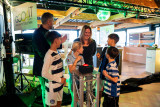
The pioneering innovations were presented of the Scale Up Future-proof artificial turf pitches project, a collaboration between Amsterdam and Haarlem focused on sustainable artificial turf pitches. Over the next few years, more than 250 sports pitches in both cities will be transformed into circular, energy-generating and climate-adaptive sports venues. These artificial turf pitches can not only generate and store energy, but also involve smart water management. An approach that is globally relevant for urban sports infrastructure.
Three consortia collaborate on the sport pitch of the future
The three selected consortia Antea Sport, EnergieVeld and GOO4iT together comprise more than 15 market players. They join forces within this innovation partnership, where there is room for long-term collaboration, co-creation and scalable innovation. The pioneering solutions will make it possible to cool down sport pitches on warm days, help dispose of and collect rainwater, make the pitches more pleasant for the users and possibly even generate energy for the surrounding area. Find out how these innovations are shaping the sport pitch of the future here.
Two municipalities: joint procurement
The Scale Up Future-proof artificial turf pitches project is a unique collaboration between two municipalities and market players. The municipalities jointly procure pooling their purchasing power and use an innovation partnership to challenge the market to test and scale up innovative and sustainable solutions. In doing so, the solutions are also scalable and transferable to other cities in the Netherlands and Europe.
From prototype to pilot fields
The first prototype fields will be constructed in Amsterdam and Haarlem in 2026, in different capacities and combining multiple innovations, where they will be extensively tested and monitored for a year. Successful concepts are then scaled up to full-scale pilot pitches and tested and monitored for another year. This will form the basis for the new standard of sustainable sports pitches, with potential for adoption in other cities around the world. At the same time, existing pitches are already being improved with the most sustainable solutions available, making an immediate impact from the start. The project thus shows how cooperation between municipalities and market players can lead to innovative, climate-proof sports infrastructure with international relevance.
Join us
This project provides cities worldwide a blueprint for sustainable, smart, and future-proof artificial turf pitches. Interested municipalities and industry partners can get in touch and subscribe to our news updates by sending an e-mail to: sportveldvandetoekomst@amsterdam.nl.
The Amsterdam Hunger Game

Learn with the case study Amsterdam to anticipate future food disruptions. Understand the city's food supply chain vulnerabilities is critical for enhancing food resilience. Enhance food resilience in empowerment of people in urban food growing.
Masterclass 3D-printen
Focussessie 3D-printen
Dinsdag 14 oktober 2025
11.00 – 17.00 uur
In deze verdiepende sessie ontdek je concrete toepassingen van 3D-printen.
Tijdens deze focussessie verwelkomen we:
<strong>Viktor Valk</strong>, Regional president bij Freemelt.
Viktor zal het gaan hebben over Electron Beam Melting. Een 3D-printtechnologie waarbij een elektronenbundel metaalpoeder selectief smelt, waardoor volledig dichte en nauwkeurige metalen opgebouwd kunnen worden.
<strong>Maarten van Rooij</strong>, Vice-president bij Ultimaker
Maarten gaat in op de laatste ontwikkelingen rondom materialen voor 3D-printen. Hij belicht hoe nieuwe kunststoffen, composieten en duurzame filamenten de mogelijkheden van 3D-printen vergroten.
<strong>René Tamboer</strong>, programmamanager digitalisering & circulaire maakindustrie bij TU Delft
René vertelt hoe de TU Delft onderzoek naar o.a. 3D-printen vertaalt naar concrete toepassingen voor bedrijven en de samenleving. Hij gaat in op de manier waarop nieuwe technieken en ontwerpen worden ontwikkeld in samenwerking met de maakindustrie, met aandacht voor duurzaamheid, efficiëntie en innovatie.
Je kunt individueel deelnemen aan deze focussessie, maar neem vooral je collega’s mee! Door ondersteuning vanuit het Europese programma EDIH is deelname aan deze focussessie kosteloos, wel dient er een staatsteunverklaring ondertekend te worden.
Innovation Dinner 3D-printen
3D-printen is allang niet meer alleen een techniek voor prototypes of kleine schaalmodellen. Inmiddels worden complete onderdelen, constructies en zelfs medische toepassingen geprint, met materialen die steeds sterker, duurzamer en veelzijdiger worden. De impact op de maakindustrie, bouw, zorg en vele andere sectoren groeit snel en daarmee ook de kansen voor bedrijven die deze technologie weten te benutten.
Ben je benieuwd hoe 3D printen jouw werk makkelijker, sneller of duurzamer kan maken? Wil je inspiratie opdoen en sparren met pioniers en experts over materialen, technieken en toepassingen? Meld je snel aan!
Wie is de gastspreker?
Tijdens het Innovation Dinner spreekt <strong>Herman van Bolhuis</strong>, oprichter van 3D Makers Zone en bestuurslid bij FME.
Vanuit zijn brede ervaring geeft hij een beeld bij de nieuwste ontwikkelingen in materialen, technieken en toepassingen.
Daarbij staat centraal hoe 3D-printen kan bijdragen aan innovatie en verduurzaming.
Wat zijn de kosten?
Dit Innovation Dinner is kosteloos.
Waag Open: van wie is de ruimte?

In de ruimte is steeds meer technologie te vinden: satellieten voor mobiel netwerk, voor weer- en klimaatmetingen en voor oorlogsvoering. Hoeveel voller kan het daarboven worden en wat hebben we daar eigenlijk over te zeggen? Op donderdag 2 oktober gaan we in gesprek met kunstenaar Michele Boulogne en antropologe Danick Trouwloon over technologie in de ruimte en de invloed daarvan op onze perceptie van de aarde.
> Hoe zien wij de aarde vanuit de ruimte? Van een afstand lijkt het een rustgevende blauwe bol. Maar in werkelijkheid staat de wereld in de fik.
De van oorsprong Frans-Caribische kunstenaar Michèle Boulogne onderzoekt hoe klimaatverandering begrepen kan – en moet – worden door de ogen van lokale gemeenschappen. De Nederlands-Caribische onderzoeker Danick Trouwloon onderzoekt ecologisch beheer en klimaatverandering in relatie tot de bevolking op de verschillende eilanden. Tijdens Waag Open gaan zij met Waag’s Miha Tursic in gesprek over wat de ruimte betekent voor verschillende culturen, ons beeld van de aarde en het klimaat, en hoe technologie én wijzelf daar invloed op hebben.
Kom op donderdag 2 oktober naar Waag Open en laat ons weten hoe jij de aarde ziet!
Programma
| 19:30 - 19:45 uur | Welkom & introductie |
|---|---|
| 19:45 - 21:15 uur | Interactief gesprek met Michele Boulogne, Danick Trouwloon en Miha Tursic |
| 21:15 - 21:30 uur | Napraten & borrel |
Waag Open
Elke eerste donderdagavond van de maand opent Waag haar deuren! Kom langs om te discussiëren en te doen. Want we gaan niet alleen in discussie over maatschappelijke thema's en de toekomst – je leert daarnaast ook altijd iets praktisch. Iets dat je altijd al hebt willen uitproberen, zoals de 3D-printer in het FabLab, of juist iets dat je nooit had verwacht, zoals uitpluizen hoe DNA in elkaar zit in ons biotech-lab. Waag Open vindt plaats in de maakplaatsen op de eerste en tweede verdieping van het historische Waaggebouw op de Nieuwmarkt.
Toegankelijkheid
Mocht je krap bij kas zitten en wel graag aan dit evenement willen deelnemen, neem dan contact op met sanna [@] waag [punt] org.
Het programma is een resultaat van het More-than-planet project en is mede mogelijk dankzij het 3Package Deal programma van het AFK dat Michele Boulogne’s werk ondersteunt.
Everything Urban 001_Interactive Talk for students and young professionals

Everything Urban 001 (LinkedIn Event) is the first in the Interactive Talk series for students and young professionals interested in Urban Affairs i.e. urban planning, urban management, architecture, sustainability, smart cities, to name some. Feel Free to attend it on September 4, 2025. More details in the link.
Demoday #28: Designing for Circularity in the Port of Amsterdam

During Demoday #28, we focused on one of the key challenges in the circular transition: how can we make the Port of Amsterdam fully circular?
The Amsterdam port is one of the largest in Europe. It functions as a major energy hub, where fossil fuels still play a central role, and as an industrial hub, where massive flows of raw materials pass through. The City of Amsterdam has set the ambitious goal of becoming fully circular by 2050. This means the port must transform as well. This is a complex and far-reaching task that requires collaboration and innovation.
In this work session, we zoomed in on circular design: how can we make products and processes circular from start to finish?
A closer look at the port
James Hallworth, Commercial Manager at Port of Amsterdam, opened the session by taking the group on a tour through the world of the port. Located in the western harbour area, the port has two main responsibilities. First, it ensures the smooth and safe handling of all maritime traffic on behalf of the City of Amsterdam. Second, it manages and develops the land and industrial areas around the harbour.
To tackle circularity, Port of Amsterdam applies industrial ecosystem thinking. In nature, waste does not exist, and the same principle should apply here. The port aims to build collaborative networks between companies, where waste flows from one company becomes raw materials for another. There is already significant activity around recycling and recovery, but more can be done in higher-value strategies on the R-ladder, such as repurposing, remanufacturing, and refurbishment. Circular by design is a key concept in this shift.
The port is transitioning from measuring success in tons to measuring added value. This shift also means thinking differently about space: circular systems require space to receive, process, and recover valuable materials from waste streams.
Getting hands-on with circular design
Creating a fully circular production process is easier said than done. That’s why we worked through two real-world cases: construction materials and e-bikes. Participants split into groups and explored what a truly circular production process might look like. We also explored the potential role the port could play as an enabler of circular supply chains.
Some key takeaways from the session:
• Material passports: A digital document containing material properties and origin can greatly simplify recycling and reuse.
• Monomaterials: Products made from a single type of material are much easier to separate and recycle at the end of life.
• Smart synergies: Mapping which companies can use each other’s waste flows as input can unlock huge circular potential.
• Financial incentives: Right now, circular processes are often more expensive than linear ones. Smart financial mechanisms could help bridge that gap.
• E-bike challenges: In the case of e-bikes, batteries were flagged as a challenge. Recycling them is still very difficult, and since they are mostly produced outside of Europe, it’s hard to have control over the production process.
This session invited participants to take a step back and view products through a circular lens. The port has the potential to become a key player in the circular transition, but to get there, it will need ideas, insights, and input from across the network.
<strong>Do you have ideas on how the Port of Amsterdam can become more circular? Or would you like to contribute to future sessions? Get in touch with Noor at noor@amsterdaminchange.com. A big thank you to James Hallworth from Port of Amsterdam for bringing this challenge to the network, and Yanti Slaats (Amsterdam University of Applied Sciences) for moderating the session.</strong>
“We’re not just creating technology for cities—we’re creating better cities for people.” From Global Goals to Local Action: How Amsterdam Is Building a Smarter, Fairer City
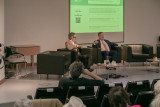
As the world grapples with massive challenges—climate change, rapid urbanisation, digital disruption, and growing inequality—some cities are not waiting for top-down solutions. They are rolling up their sleeves and experimenting with new ways to improve life for everyone, block by block. Amsterdam is one of those cities.
That’s why I was proud to share Amsterdam InChanges approach to smart, inclusive urban innovation at the #CIPPCD2025 conference in Aveiro.
Through our open innovation platform, <strong>Amsterdam InChange</strong>, the city has become a global leader in turning lofty global ambitions into practical, local action. But Amsterdam’s model isn’t built around flashy tech or utopian blueprints. Instead, it’s grounded in an essential question: How can we use innovation to improve people’s everyday lives?
Local Action for Global Challenges
Amsterdam understands that the climate crisis, digital transition, and social inequality can’t be solved by government alone—or by technology alone. That’s why it launched Amsterdam Smart City in 2009 as a public-private partnership. What began as small-scale energy-saving pilots has grown into a community of over 8,500 members, coordinating more than 300 projects across the city and beyond.
The approach is rooted in co-creation. Citizens, companies, knowledge institutions, and government actors come together to design, test, and scale solutions that serve the public good. The values that guide the network are clear: people first, openness, transparency, learning by doing, and public value.
The Doughnut as a Compass
Amsterdam was the first city in the world to embrace Doughnut Economics as a guiding framework. The “City Doughnut,” developed with economist Kate Raworth, helps policymakers balance the city’s ecological footprint with the social foundations that all citizens need: housing, education, health, equity, and more. It’s a tool to align every local decision with both planetary boundaries and human dignity.
This framework has inspired circular construction strategies, neighbourhood energy co-ops, and more inclusive procurement policies. It shows that global concepts can become real when grounded in local practice.
Making Innovation Inclusive
One of Amsterdam’s core beliefs is that smart cities must be <strong>inclusive cities</strong>. That means tackling issues like <strong>mobility poverty</strong>, where rising transport costs and digital-only services make it harder for low-income or elderly residents to get around.
Through the <strong>Mobility Poverty Challenge</strong>, Amsterdam partnered with the Province of North Holland and researchers from DRIFT to understand where and how exclusion occurs—and to design better public mobility systems. Pilot ideas like a “Mobility Wallet” (a subsidy for essential travel) and more inclusive digital apps emerged from real conversations with affected residents.
The same inclusive mindset guides Amsterdam’s digital transformation. In the suburb of Haarlemmermeer, officials flipped the script on e-government. Instead of asking citizens to become “digitally skilled,” they asked how government systems could become more <strong>humane</strong>. This led to simplified interfaces, better access to services, and ultimately more trust.
Responsible Tech and Energy from the Ground Up
Tech transparency is another pillar of the Amsterdam model. The city runs the world’s first <strong>Algorithm Register</strong>, giving the public insight into how AI and automated systems are used in services—from traffic enforcement to housing applications. Anyone can access this register, offer feedback, and better understand how digital decisions are made.
In the energy space, the city supports both bold innovation and careful upscaling. At the <strong>Johan Cruijff ArenA</strong>, used electric vehicle batteries store solar energy, powering concerts and matches with clean backup power. At the same time, a coalition of partners led by Amsterdam InChange is working to scale up Local Energy Systems by collecting lessons learned and creating a toolkit for community-led energy.
What Makes It Work?
If there’s one secret to Amsterdam’s success, it’s the governance model: small, neutral facilitation teams guiding large multi-stakeholder coalitions, anchored by public trust and shared purpose. Regular Demo Days allow project teams to showcase progress, get feedback, and adapt. This culture of transparency and iteration helps avoid the so-called “innovation graveyard,” where pilot projects go to die.
The city also embraces failure—as long as it’s shared and learned from. Reports like “Organising Smart City Projects” openly list lessons, from the importance of strong leadership to the need for viable business models and continuous user involvement.
An Invitation to Other Cities
Amsterdam’s smart city is not a blueprint—it’s a mindset. Start with your biggest local challenge. Bring the right people together. Make space for experimentation. Build bridges between local and global. And, above all, put citizens at the centre.
As international smart city ambassador Frans-Anton Vermast puts it: “We’re not just creating technology for cities—we’re creating better cities for people.”
The III International Conference on Public Policies and Data Science
Digital Society School - Transformation Learning Programme Info session
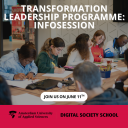
Call to all aspiring leaders!
Are you looking for the next step in advancing your leadership and management skills in alignment with your current role?
Join our upcoming info session on June 11th to learn more about the Transformation Leadership Programme (TLP) – Digital Society School’s part-time programme designed for professionals ready to lead change in the digital and sustainable transition.
We’re looking for Netherlands-based professionals with a Master’s degree and at least 2 years of relevant work experience, particularly with skills in project and team management.
During the info session we will be joined by former Transformation Owners from the TLP track who will share their own experiences during the programme.
The info session will take place online on June 11th 16:00 CET. See you then!
Amsterdam Data Design Den- Beyond the Graph
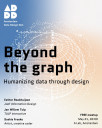
Amsterdam Data Design Den is the city's newest community meetup celebrating the intersection of data, design, and storytelling. In an era where information surrounds us, we believe in the power of creative visualization to transform complex data into compelling narratives that inspire and inform.
Every couple of months, we bring together professional designers, creative studios, and emerging talents in an informal setting to share groundbreaking projects and foster meaningful connections. Our speakers range from established design studios showcasing large-scale data visualization projects to independent designers experimenting with novel approaches to information design.
What makes our meetup unique is its commitment to accessibility and community. There's no entry fee, no membership requirements—just a gathering of curious minds passionate about using design to make sense of our data-driven world. Whether you're a seasoned information designer, a student exploring data visualization, or simply intrigued by the creative possibilities of data storytelling, you'll find your place here.
Join us for an evening of inspiration, networking, and casual conversations over drinks. Each session features thought-provoking presentations followed by open discussions, creating an environment where ideas flow freely and collaborations naturally emerge.
Amsterdam Data Design Den meets in the heart of Amsterdam, bringing together the city's vibrant creative community to explore the future of data visualization and information design.
Vacancy: PhD position on The Organization of Innovation for Sustainability Transition at Vrije Universiteit Amsterdam
Have you obtained a master's degree in social and/or organization sciences, and would you like to study innovation and change? Then consider joining our interdisciplinary team with a PhD research on accelerating sustainability transitions!
This PhD position is part of an interdisciplinary team of three PhD researchers, one postdoc, and two senior researchers in the project ‘EXTRA’: <em>From EXperiment to sustainable change: TRAnsformative methodologies for innovation and learning</em>. EXTRA is a collaboration between multiple universities and public and private partners to research and advance physical and experimental environments as enabling methodologies for learning and innovation, also known as living labs.
Living labs are applied by various change-makers, including governmental actors, industry partners, NGOs, researchers, and citizens, to co-create innovations. However, while much experimentation and innovation occur, achieving long-term systemic change remains difficult. Therefore, the main purpose of EXTRA is to amplify the transformative power of living labs with novel insights, instruments, and human capacities, thus enabling change-makers to make sustainable changes and societal impacts.
In the consortium this PhD research will focus on the organization of innovation to accelerate sustainability transition. More specifically, by gathering knowledge and analyses across different fields and cases, this research will identify and validate (inter)organizational approaches, interventions, and business models to overcome barriers and enable the public-private collaboration needed for embedding, translating, and scaling innovations.
For more information about the project, please visit: https://www.nwo.nl/nieuws/financiering-voor-onderzoeksproject-over-fysieke-experimentele-omgevingen ; https://www.tudelft.nl/2024/bk/nwo-financiering-voor-innovatief-onderzoek-naar-fysieke-experimentele-omgevingen.
Innovation Dinner Robotica
𝗥𝗼𝗯𝗼𝘁𝗶𝗰𝗮 𝗯𝗶𝗲𝗱𝘁 𝗸𝗮𝗻𝘀𝗲𝗻. 𝗠𝗮𝗮𝗿 𝗮𝗹𝗹𝗲𝗲𝗻 𝗮𝗹𝘀 𝗷𝗲 𝘄𝗲𝗲𝘁 𝘄𝗮𝗮𝗿 𝗷𝗲 𝗺𝗼𝗲𝘁 𝗯𝗲𝗴𝗶𝗻𝗻𝗲𝗻.
Welke taken kun je automatiseren zonder je hele proces om te gooien?
Hoe weet je of cobots geschikt zijn voor jouw productieomgeving?
En wat kost het – in tijd, geld én kennis – om echt aan de slag te gaan?
Op woensdag 23 april organiseren we een Innovation Dinner over robotica, samen met BouwLab R&Do – speciaal voor professionals in de maak- en bouwsector die serieus werk willen maken van slimme productie.
Franc Mouwen (European Innovation Council) deelt zijn inzichten over technologische doorbraken en de stappen die bedrijven écht verder helpen – van technische kennis opbouwen tot financiering en samenwerking.
Na het dinner kun je kiezen voor een tweedelige workshopreeks waarin we samen de praktijk induiken: wat werkt, waar begin je en hoe zorg je dat het blijft werken?
📅 Workshops: 7 & 14 mei | 13.00-17.00 uur
🆓 Deelname is kosteloos
𝗩𝗿𝗮𝗴𝗲𝗻? Mail Sem via sem@3dmz.nl.
Waag Open: Plataan-check

Er zijn allerlei manieren om luchtkwaliteit te meten, met sensoren, filters of zelfs met planten! Verken met Urgenda de mogelijkheden van natuurlijke sensoren: boomschors van platanen. Deze Waag Open vormt de aftrap van de landelijke actie van Urgenda: De plataan-check.
Platanen kunnen met hun schors veel vertellen over de hoeveelheid fijnstof in hun omgeving. In hun bast slaan ze (fijn)stof uit hun omgeving op. Onderzoekers kunnen met laboratoriumonderzoek uit de bast aflezen hoeveel fijnstof er in de omgeving van de boom is uitgestoten.
Samen met Urgenda verzamelen we tijdens Waag Open boomschors van de plataan. Daarbij vertelt Urgenda hoe plataanschors inzicht geeft in de hoeveelheid fijnstof in Nederland. Daarnaast leidt Imme Ruarus, hoofd van Waag’s Smart Citizens Lab, de avond in met een introductie over citizen sensing: hoe bewoners met technologische metingen, natuurlijke metingen en observaties hun leefomgeving in kaart brengen.
Na Waag Open kun je zelf aan de slag met plataanschors verzamelen en meedoen met de plataan-check!
Demoday #27: Zero Emission City Logistics - The Food Center Amsterdam Case. Hosted by the Interdisciplinary Graduation Circle (HvA)
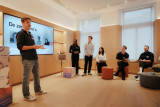
Amsterdam faces a major logistics challenge: from January 2025 onwards, polluting delivery vans will no longer be allowed in the city centre. How can entrepreneurs and suppliers in the food sector prepare for this and turn the transition into a success? Four fourth-year students from the Amsterdam University of Applied Sciences (HvA) are working together in an interdisciplinary graduation circle to find solutions. They are addressing both the technical aspects of this issue and the communication side. Drawing on their different fields of study, they analyse the problem and develop a joint recommendation for the Amsterdam Transport Region (Vervoerregio Amsterdam). As part of their research, they used this working session as a focus group with stakeholders from the Amsterdam InChange network.
Opening of the session
Stan van der Meer (Logistics Management), Chanel Pinas (Digital Marketing), Jay van den Boog (Digital Marketing), and Vanessa Man (Logistics Engineering) opened the session with a few questions to get a sense of the participants in the room. The attendees rated their own level of expertise on the topic and wrote down a word they associated with the issue.
The room was filled with expertise: policymakers from the Municipality of Amsterdam directly involved in the issue, as well as researchers and advisors from Arcadis and Cenex who are actively working on zero-emission logistics. Representatives from the Port of Amsterdam and EIT Urban Mobility (a European network) were also present, each bringing their own perspective on the challenge.
Statements and discussion
The students facilitated the discussion by presenting a number of statements, and moderating the group discussions that followed. Below are a few observations.
Statements 1 and 2 (summarized): Amsterdam entrepreneurs are aware of the new zero-emission policy, and it is clearly presented to them.
There was broad consensus within the group regarding the city’s policy. Communication from the Municipality of Amsterdam has been extensive over the past ten years — first targeting larger logistics partners in the city, and more recently also via letters to local entrepreneurs. In addition, physical signs throughout the city communicate the new regulations. However, what can cause confusion among entrepreneurs are the mixed signals coming from national politics and policies. This can create the impression that there is a lack of determination or vision behind the transition, making entrepreneurs hesitant to invest in new electric vehicles.
Statement 3: There is sufficient support for entrepreneurs to switch to zero-emission transport.
The group also agreed that the municipality is doing a good job offering financial support where needed. Advisors, for example, are available to guide entrepreneurs through the rules and support options. However, it was noted that the target audience still does not always have a clear overview of all the possibilities. While the municipality communicates well and “presents” the available opportunities, confusion and uncertainty remain among entrepreneurs on the streets. This represents an important communication challenge that the students will further explore.
Also, regarding this statement and the ones before, it was noted that the (micro)entrepreneurs and stakeholders we were talking about weren't present in the room. It would have been good to have more of the target group in the room, but for this session specifically the policymakers and specialists from our network were the ones the students focussed on. In the following months of their research, their focus will be on the specialists and (micro)entrepreneurs in the food sector.
Statement 4: Logistics hubs play an important role in reducing transport movements in the city.
This part of the discussion became more technical. The group agreed that a new logistics system with greater use of hubs throughout the city is, in theory, a logical and effective step in this transition. In practice, however, it is not as simple as it sounds. For example, consider the Port of Amsterdam — an existing large hub at the edge of the city for water-based transport. While goods can be transferred there to smaller vehicles for distribution within the city, docking on the busy canals poses a significant challenge. Additionally, water transport was the first sector required to become fully electric, and this system is currently somewhat reduced in scale
Road transport is also complex. Hubs are locations where goods from different suppliers can be combined and delivered with fewer transport movements. But who holds responsibility for these goods if something goes wrong? And how can this be managed without adding too much delivery time?
One of the participants summarized it well: we are shifting from logistics as a chain, where each party is responsible for a small part, to an ecosystem where all actors and the physical infrastructure depend on one another, share collective responsibility, and need to exchange information and services to keep the system running.
In-depth interviews
The second part of the session consisted of two breakout groups in which the students could ask targeted questions for the research they are conducting. Jay and Chanel spoke with several participants about the research side of the project, delving deeper into successful research methods that involve entrepreneurs. Stan and Vanessa spoke with another group of participants about potential solutions for this issue, gathering knowledge about existing innovations and solutions or what might still be needed for this logistical transition.
Follow-up
Through this focus group, the students in this interdisciplinary graduation circle have engaged in dialogue with experts on this topic from various organizations. They also made many new contacts and actively shared their project with the network. During our upcoming Knowledge and Demo Day on June 5, they will once again be part of the program and present their results and potential conclusions.
Would you like to know more about the graduation circle, the research topic, or do you have tips or questions for the students? Feel free to reach out via pelle@amsterdaminchange.com
Cenex Nederland Lenteborrel 2025 - 8 mei

🌿 Vier de lente met ons tijdens de Cenex Nederland Lenteborrel 2025! 🌸
[English below]
Op 8 mei 2025 organiseren we weer een nieuwe editie van de Cenex Lenteborrel! Dit jaar is de editie open voor iedereen, het wordt een inspirerende middag vol innovatie, samenwerking en netwerkmogelijkheden.
📍 Locatie: A-lab, Overhoeksplein 2, 1031 KS Amsterdam
🕒 Tijd: 13:30 - 18:30
✨ Wat kun je verwachten?
🔹 13:30 - 15:30 – Inloop & exposanten
Ontmoet onze exposanten en ontdek de nieuwste innovaties op het gebied van mobiliteit en circulariteit.
🔹 13:30 - 15:00 – Twee serious games
Doe mee aan een interactieve sessie en verken de uitdagingen en kansen in de sector op een speelse manier. Liever toeschouwer? Dat kan ook! (Kies één sessie)
🔹 15:30 - 16:45 – Vijf inspirerende keynotes (Engels)
We verwelkomen sprekers van onder andere:
⚡ Coding the Curbs
⚡ Kempower
⚡ Ministerie van Infrastructuur en Waterstaat
⚡ Circular Campus
⚡ Cenex Nederland
🔹 16:45 - 18:30 – Gezellige Lenteborrel
Sluit de dag af met een hapje en een drankje, terwijl je nieuwe connecties legt met andere professionals.
Houd onze Eventbrite-pagina en LinkedIn in de gaten voor updates over sprekers en exposanten!
📢 Bevestig je aanwezigheid en mis het niet! (Beperkt aantal tickets beschikbaar)
Registreer hier: https://cenex-lenteborrel-2025.eventbrite.nl
-------English
🌿 Join us for the Cenex Spring Reception 2025! 🌸
On May 8, 2025, we’re hosting the latest edition of the Cenex Lenteborrel (Spring Drinks)—and this year, it’s open to all! Expect an inspiring and engaging afternoon filled with innovation, collaboration, and networking.
📍 Location: A-lab, Overhoeksplein 2, 1031 KS Amsterdam
🕒 Time: 13:30 - 18:30
✨ What’s in store?
🔹 13:30 - 15:30 – Walk-in & exhibitor showcase
Meet our exhibitors and explore the latest advancements in mobility and circularity.
🔹 13:30 - 15:00 – Two serious games
Join an interactive session tackling industry challenges in a fun, engaging way. Prefer to observe? That’s possible too! (Choose one session.)
🔹 15:30 - 16:45 – Five inspiring keynotes (English)
Industry leaders will share their insights, including:
⚡ Coding the Curbs
⚡ Kempower
⚡ Ministry of Infrastructure and Water Management
⚡ Circular Campus Delft
⚡ Cenex Netherlands
🔹 16:45 - 18:30 – Spring Networking Reception
Wrap up the day with drinks, bites, and great conversations with fellow professionals.
Stay tuned via our Eventbrite page and LinkedIn for speaker and exhibitor updates!
📢 Confirm your attendance and don’t miss out! (Limited tickets available)
Register here: https://cenex-lenteborrel-2025.eventbrite.nl
Life Cycle Analysis serious game
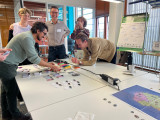
🎲♻️ Doe mee aan onze Life Cycle Analysis Serious Game!
Aanstaande dinsdag organiseren we onze Cyclum Vitae-serious game tijdens de Week van de Circulaire Economie!
Bij Cenex Nederland geloven we in het vertalen van kennis naar impact—en dat is precies waar Cyclum Vitae om draait. Dit boeiende bordspel neemt spelers mee op reis om de principes van een Life Cycle Analysis en de milieueffecten van product productie, gebruik en afvalverwerking te begrijpen.
🌱 Wat is de uitdaging? Spelers navigeren door realistische afwegingen, van het kiezen van materialen en productiemethoden tot het beheren van productgebruik en einde-levensduur. Het doel? Het meest duurzame product ontwerpen terwijl je concurrerend blijft in de markt.
📅 Wanneer: 18 maart, 14:00 - 16:00
📍 Waar: A-Lab, Overhoeksplein 2 (Lab 207)
Voor Engels- en Nederlandstaligen
🔗 Meld je aan via e-mail
BouwLab Software Summit

Op 22 mei 2025 organiseert Smart Tech fieldlab BouwLab R&Do de BouwLab Software Summit 2025 in Haarlem. Het thema van dit jaar is "Beyond BIM", waarbij de focus ligt op de volgende fase in de digitalisering van de bouwsector. Het evenement brengt experts, softwareontwikkelaars, opdrachtgevers, ontwerpers en beleidsmakers samen om de digitale toekomst van de bouw vorm te geven.
Het programma bevat diverse sessies, waaronder:
✅ Studio Talks over AI, standaardisering versus parametrisering, datamodellen en ketensamenwerking.
✅ Software Stand-up Sessions met innovatieve softwareontwikkelingen.
✅ BouwBoosts en table-top presentaties om inzichten te delen en samenwerkingen te stimuleren.
✅ Netwerkborrel om in contact te komen met professionals uit de sector.
Tickets
🎟 Softwaregebruikers: €99 (excl. btw)
🎟 Softwareaanbieders: €499 (excl. btw)
Tickets zijn inclusief lunch, toegang tot alle sessies, de netwerkborrel en gratis parkeren.
Wil je meer informatie? Bekijk de details en bestel je ticket op: softwaresummit.nl
Innovation Dinner - Cultuurverandering in de bouw
Op woensdag 26 maart organiseren BouwLab R&Do en 3D Makers Zone vanuit het programma van de EDIH het Innovation Dinner Cultuurverandering in de bouw.
De bouwsector staat op een keerpunt. Jarenlang werd er traditioneel en lineair gewerkt, maar de uitdagingen van vandaag - verduurzaming, digitalisering en circulariteit - vragen om een fundamentele transformatie. Wie niet meebeweegt, blijft achter.
Tijdens deze avond gaan we dieper in op de volgende thema's:
- Van afval naar waarde - Hoe maken we circulair bouwen de norm? Jaarlijks produceert de Nederlandse bouwsector meer dan 20 miljoen ton afval! In een wereld waar grondstoffen schaars worden, is dat onhoudbaar. Innovatieve bedrijven laten zien dat het anders kan. Gebouwen worden gesloopt met een materialenpaspoort, zodat onderdelen een tweede leven krijgen. Prefab houtbouw vervangt traditionele bouw, waardoor woningen sneller, lichter en met een lagere CO2-uitstoot gerealiseerd kunnen worden.
- Digitalisering als versneller - Hoe benutten we AI, digital twins en data? Ook digitalisering speelt een cruciale rol in de modernisering van de bouw. Digital twins, AI en big data kunnen bouwprocessen optimaliseren, terwijl drones en 3D-scans de veiligheid en nauwkeurigheid vergroten.
- <strong>Samenwerken of stagneren?</strong> - Hoe doorbreken we silo's en creëren we ketensamenwerking? Verandering komt alleen tot stand als bedrijven over hun eigen schaduw heen stappen. Ketensamenwerking, waarin partijen niet alleen contractueel maar ook inhoudelijk verantwoordelijkheid delen, is noodzakelijk voor circulariteit en digitalisering. Dat verlangt nieuwe verdienmodellen, waarbij niet alleen de laagste prijs maar de waarde op lange termijn centraal staat.
- Van traditie naar toekomst - Hoe breken we met oude patronen?
🚀 Maak je bedrijf toekomstbestendig met de Circulaire Kansenkaart Noord-Holland! 🌍
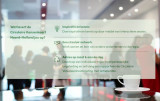
Wil jij als mkb-ondernemer concrete stappen zetten naar een circulaire bedrijfsvoering? Provincie Noord-Holland en Circulair West bieden samen met Route Circulair een GRATIS traject aan voor maximaal 10 bedrijven.
✅ Praktische tools en begeleiding
✅ Inspiratie en kennis via interactieve sessies
✅ Netwerken met andere ondernemers
✅ Persoonlijk advies en actieplan
#aanmelden? Lees verder in dit artikel: https://lnkd.in/eRA5qvAN
Stay up to date
Get notified about new updates, opportunities or events that match your interests.

